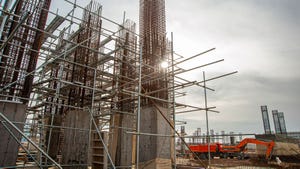RagingWire 2.0: New Data Center Design, New Markets
DCK Investor Edge: Small, private-company mentality is out; a new, market-driven super-wholesale focus is in.
May 31, 2018

Like Schrodinger's Cat, both dead and alive at the same time, RagingWire is both publicly traded and isn’t. Its parent, the Tokyo-based giant NTT Communications, trades on the public market and reports quarterly earnings, but those earnings don’t detail RagingWire’s results. Analysts don’t get to grill the US data center provider’s CEO Doug Adams on an earnings call once every three months.
NTT has been Reno, Nevada-based RagingWire’s parent since it bought an 80-percent stake in 2014. It acquired the remaining 20 percent last year. NTT is one of the largest multinational telecommunications and data center companies, providing services in 190 countries and regions. According to the latest estimate by Synergy Research Group, released this week, NTT is the world’s third-largest data center colocation company, behind Digital Realty Trust and Equinix, the market leader.
Most of NTT’s 6-percent share of the global market consists of retail colocation, with RagingWire contributing to the sliver of revenue that comes from wholesale colocation. The access to low-cost capital that comes with being owned by NTT – a weighted average cost of 1 percent – gives RagingWire a huge advantage when it comes to penciling out super-wholesale deals.

NTT's data center empire
Raging Wire 2.0
As Adams explained to Data Center Knowledge in an exclusive interview, his strategic goal of transforming RagingWire from operating like a private company to operating like a public one has now been accomplished.
He’s been fine-tuning all areas of business – operations, engineering, construction, sales, and marketing – to address the current demand from hyperscale customers and more traditional enterprises. It’s been a two-year process.
Speed and Flexibility
RagingWire has always built at massive scale. But its private-company operating mentality meant it was inclined to keep many functions in-house, including data center design and construction. Today, a management team Adams has assembled since he officially took helm last February, oversees an outsourced design-build process utilizing best-in-class partners.
RagingWire needed to become more agile, especially when it came to the data center deployment speed hyperscale platforms now require. One goal was to accelerate the move-in and ramp-up process, in some cases cutting the time from six months to six weeks.
The "classic" RagingWire 2N+2 electrical design was always engineered well above industry norms. The private-company go-to-market strategy was based around building a better mousetrap. But the super-wholesale market has evolved. Many top customers don't need that level of redundancy and don’t want to pay for it.

Global colocation market share, Q1 2018
To lower the cost and accelerate speed-to-market, RagingWire’s new standard design is N+1, which is a major departure from what it’s long been known for but also the kind of redundancy hyperscalers are now after. RagingWire 2.0 still has flexibility to offer customers 2N, 2N+1, all the way up to the classic 2N+2, Adams said.
The company has two standardized building footprints for most markets: a single-story 16MW design and a two-story 32MW one. The new design-build program is built around 2MW modules, where the supply chain can be optimized while still allowing for customization. Mechanical-equipment modules for cooling are now prefabricated off-site and delivered on skids. The next refinement will be getting the major electrical components delivered in a similar fashion.
Contending for Hyperscale
RagingWire opened VA3 in Ashburn, Virginia, this March: a 245,000-square foot facility with 16MW of critical IT load. All-in construction cost was about $10 million per megawatt, Adams said.

RagingWire VA3 data center design
The company is already pre-leasing the next one, VA4, which will use the new two-story 32MW design. It will be an N+1 data center with slab-on-grade instead of a raised floor, which is also something today’s super-wholesale customers are after. Adams expects all-in development cost to be considerably lower than VA3.
Expanding in Santa Clara and Chicago
Northern Virginia isn’t the only market RagingWire is expanding in. It has a 20-acre parcel in Chicago and has recently acquired a site in Santa Clara, California – both new markets for the developer.
The Santa Clara property, its second site in California but first in Silicon Valley, is currently going through entitlements for a multistory data center. The design will be taking advantage of its Japanese parent’s engineering group’s experience building in seismically unstable areas.
RagingWire has other expansion sites in the Americas in various stages of development, which will be announced over the next few months, Adams said.
Investor Edge
The NTT brand encompasses a global data center platform that can offer solutions in more than 140 locations. Hyperscale customers looking at initial lease terms of seven to 12-plus years can contract with a counterparty that de-risks the transaction.
The record levels of capital hyperscale platforms are now investing in infrastructure have created an urgency among super-wholesale data center providers to accommodate their unique requirements, which is the main catalyst for the emergence of RagingWire 2.0.
There is no shortage of data center providers in top US markets, but RagingWire’s evolution from a product-focused small-company mentality to embracing flexible market-driven designs could result in winning far more market share.
Read more about:
North AmericaAbout the Author
You May Also Like







